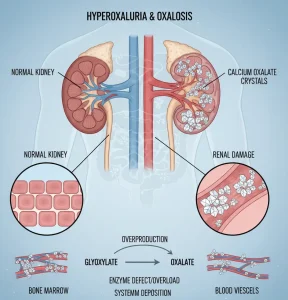Overview
Diagnosis
Diagnosing hyperoxaluria usually begins with a thorough physical examination and a review of your medical history and eating habits. Your healthcare provider may order several tests to confirm the condition and identify its underlying cause.
Common diagnostic tests include:
-
Urine tests: A 24-hour urine collection helps measure oxalate and other substances in the urine.
-
Blood tests: These check kidney function and measure oxalate levels in the blood.
-
Stone analysis: If you pass kidney stones or have them surgically removed, a lab can analyze their composition to confirm if they are made of calcium oxalate.
-
Imaging tests: X-rays, ultrasound, or CT scans help detect kidney stones or calcium oxalate buildup in the body.
Additional diagnostic tests may include:
-
DNA testing to identify gene mutations that cause primary hyperoxaluria.
-
Kidney biopsy to check for oxalate buildup in kidney tissue.
-
Echocardiogram to detect oxalate deposits in the heart.
-
Eye exam to look for oxalate buildup in the eyes.
-
Bone marrow biopsy to assess oxalate deposits in bones.
-
Liver biopsy to identify enzyme deficiencies, performed only when genetic testing is inconclusive.
If primary hyperoxaluria is diagnosed, genetic testing for siblings and family counseling are recommended. Families planning more children may also consider genetic counseling to understand their risks and testing options.
Treatment
Treatment for hyperoxaluria depends on the type, severity, and symptoms of the disease, as well as how well the patient responds to therapy. The main goals are to reduce oxalate levels, prevent kidney stones, and protect kidney function.
Reducing oxalate
To decrease calcium oxalate crystal formation in the kidneys, your doctor may recommend:
-
Medications:
-
Lumasiran (Oxlumo) to lower oxalate levels in both children and adults with primary hyperoxaluria.
-
Vitamin B-6 (pyridoxine) to reduce urinary oxalate levels in certain cases.
-
Phosphate and citrate supplements to prevent crystal formation.
-
Thiazide diuretics or calcium supplements for those with enteric hyperoxaluria to help bind oxalate in the gut.
-
-
Increased fluid intake: Drinking plenty of water helps flush the kidneys, prevent crystal buildup, and reduce stone formation.
-
Dietary adjustments: For enteric or diet-related hyperoxaluria, limiting foods high in oxalates, reducing salt and animal protein, and moderating sugar intake may help. Your healthcare team will guide you on suitable dietary changes.
Kidney stone management
Kidney stones often occur in people with hyperoxaluria. While smaller stones may pass naturally, larger ones that cause pain or urinary blockage may require removal or fragmentation procedures to help them pass safely.
Dialysis and transplants
If kidney function declines significantly, dialysis may be needed to remove oxalate and waste products from the blood. However, dialysis cannot fully keep up with oxalate production in severe cases.
-
A kidney transplant or combined kidney and liver transplant may be required for advanced primary hyperoxaluria.
-
A liver transplant can cure certain types of primary hyperoxaluria by correcting the enzyme deficiency that causes oxalate buildup.
Early diagnosis and consistent treatment can help manage hyperoxaluria effectively, prevent complications, and protect long-term kidney health.
Advertisement

